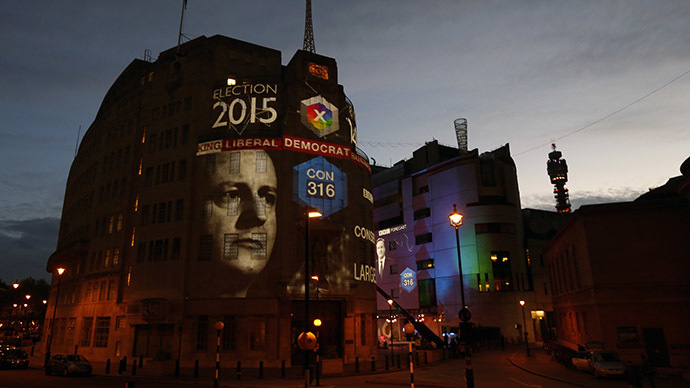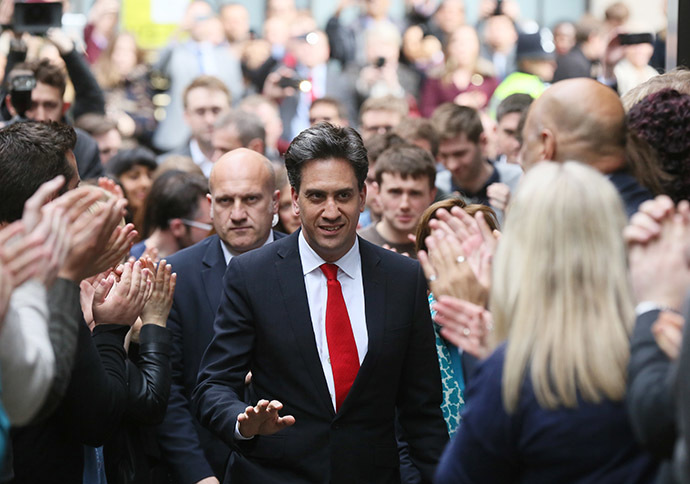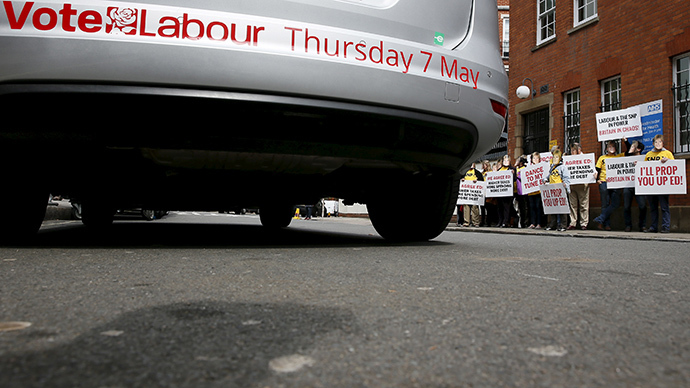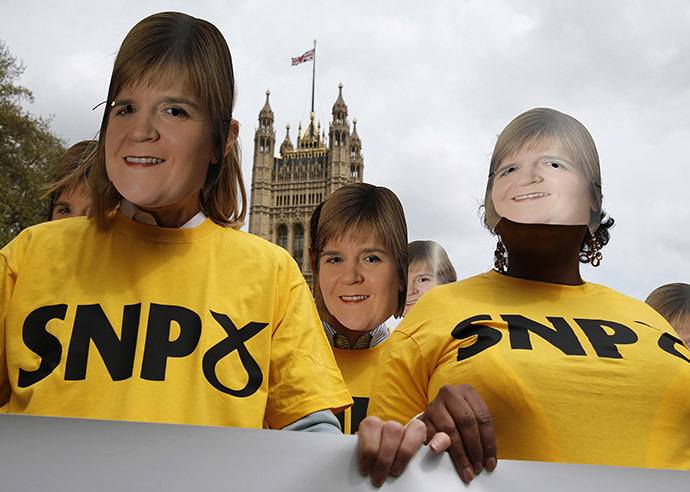UK general election: Establishment wins again?

Football presenter and ex-England international Gary Lineker once joked: “Football is a simple game; 22 men chase a ball for 90 minutes, and, at the end, the Germans always win.” We could say something very similar about general elections in the UK.
They’re a simple game: Lots of parties stand, we have a "democratic" choice, and, at the end, the party favoured by the British Establishment always wins.
The exit poll on Thursday night, which showed the Tories well ahead of Labour (despite all the earlier polls predicting a close-run contest) caused surprise to many, but really we shouldn’t have been too shocked. We've been here before.
If you had a sense of déjà vu when watching the results come in on election night, then it’s understandable – what happened in 2015 was an almost exact replay of what happened in 1992. Back then, polls told us that Labour would do quite well, and progressives confidently expected the Tory government to be ousted. But instead, it was Labour that fared poorly, and the Tories were re-elected.
What Thursday confirmed was that the Conservatives are Britain’s natural party of government. Labour wins are mere aberrations and only come about in very special circumstances.
Consider the facts. From 1918-1945 the Conservatives were in power, either on their own, or in a Coalition, for all but a nine-month period in 1924, and a period of two years and five months between 1929 and 1931. They were in power for 13 years between 1951 and 1964 and then for 18 years between 1979 and 1997. Now, having won this week’s election they will chalk up at least another 10 years in office. How does the party of the rich and whose Thatcherite policies, by any objective assessment, are positively injurious to the majority of ordinary people, keep pulling it off?
It‘s important to understand Britain's seemingly "democratic" system is designed to bring about the "right result" every time for the Establishment. We’re allowed to have quite a broad choice of parties, but the system is rigged to make sure that parties who don’t satisfy elite interests are doomed to failure. Here’s how it is done.

Electoral system
Firstly, there’s our hopelessly undemocratic electoral system. The Conservatives got 331 seats under "first past the post." But if we’d have had a more proportional system, the result would have been very different, as this Daily Express article shows.
Under the D’Hondt system of proportional representation UKIP would have got 83 seats and the Greens 24: instead on Thursday they only got one seat each despite getting a total of over 5 million votes. People would have been much more likely to vote for smaller progressive parties, like the National Health Action Party and the Trade Union and Socialist Coalition, if we had a system in which every vote counted.
Although they did once lose out by the system (in February 1974 when they got more votes than Labour but less seats), first-past-the post has generally been very kind to the Conservatives. Throughout the Thatcher years, for instance, first-past-the post helped give the 'Iron Lady' huge parliamentary majorities, despite the majority of Britons not voting for her hard-right program.
Media
Secondly, there’s the role of the media, which is overwhelming pro-Conservative.
Just four national newspapers, The Daily Express, The Daily Mirror, The Guardian and the pro-worker Morning Star, supported parties other than the Conservatives. The Conservatives had the powerful Rupert Murdoch media empire on their side and once again, the Dirty Digger’s party that wanted to win the election did so, helped by the propaganda efforts of his titles.
The national broadcaster played its part too in maintaining the status quo. The BBC makes some wonderful programs and has some great, professional journalists, but its political coverage – particularly during election time – is biased towards the establishment-favored party. The Beeb’s sympathetic treatment of the Tories during Election 2015 shouldn’t surprise us, as the head of BBC News and Current Affairs is a man called James Harding, who was previously editor of Rupert Murdoch’s neocon newspaper The Times, while the BBC’s leading political presenter, Evan Davis, is a right-wing neoliberal who once wrote a book calling for privatization of the public services. During an election campaign, the BBC acts as a filter to make sure genuinely anti-Establishment, left-wing voices are not heard.
I’ve been a regular interviewee on BBC radio in recent years but in the six week election campaign I got no call from the national broadcaster to talk about politics and I know I’m not the only dissident voice who has been passed over. When was the last time, for instance, you saw Seumas Milne, Tariq Ali, John Pilger or Lindsey German, convenor of the Stop the War coalition, on Newsnight, Question Time or indeed any other BBC politics or current affairs program? There were plenty of excellent, progressive parties to vote for in the General Election, but the BBC – and other media – made sure we didn’t hear too much about them and their policies.
Jenny Sutton, of TUSC, eloquently spelled out the problem in an interview on election night with Bill Dod on RT: "Even though we have a presence on the ground what we don’t have is a media presence. Aside from Russia Today, actually there’s been a virtual media blackout."
In Britain, the reality is that TV viewers need to switch on to a Russian network to find out about progressive parties standing in Britain elections – and that Russian network is of course, for obvious reasons, relentless attacked by Establishment commentators who only want elite-friendly voices to be heard.
The Establishment, via the media, also acts to make sure that the election is only fought on the issues that the Establishment wants them to be fought on. The dominant theme this time round was the growing "strength" of the UK economy and how the Conservatives were doing such a brilliant job in sorting out the terrible "mess" that Labour had left. "Labour wrecked the economy, the Tories have got us on the right road, so why vote for change," was the message repeatedly drummed into voters.
There was little, if any, proper discussion of the Conservatives’ many failures in office. For instance, the truly scandalous way they had sold off the Royal Mail at way below its market value was barely mentioned. If there had been proper media coverage of the way Tories have sold off public assets to their City chums, and the future privatizations Cameron and Co have planned (Chancellor George Osborne has pledged to sell off £20bn more of state assets by 2020), then the Tories would not get anywhere near the amount of seats they did.

Scaremongering
Then there’s the relentless scaremongering about what would happen if voters voted the "wrong way." This tactic goes back a long way. In 1924, there was the notorious Zinoviev letter incident, which I wrote about here, and which was designed to sabotage the electoral chances of the Labour Party by linking them to the Soviet Union. The "Red scare" and/or "Russians are coming" line is deployed whenever the Labour Party is deemed by the elite to be too left-wing. Those of a certain age can think back to 1983 and the warnings of what would happen if Labour, committed to a policy of unilateral nuclear disarmament, came to power. On election day in 1992, the front page of Murdoch’s Sun, Britain’s highest circulation newspaper, read: "If Neil Kinnock (the Labour leader) wins today, will the last person to leave Britain please turn out the lights?" Labour lost the election and the Sun proudly proclaimed: "It was the Sun wot won it."
This time, the scaremongering concerned the SNP leader Nicola Sturgeon, who was portrayed in England as a fanatical Marxist and nationalist who would wreck the UK if Labour got in and was dependent on SNP support. The only way to prevent the "nightmarish" possibility – of a genuine progressive party which was anti-militarist and anti-Trident holding the balance of power, was to vote Tory.
“A week today, Britain could be plunged into the abyss. A fragile left-wing Labour minority, led by Ed Miliband and his union paymasters and supported by the wreckers of the Scottish National Party, could take power… You can stop this. But only by voting Tory,” The Sun warned. Yet to show how cynical the whole thing is, the Scottish Sun, also owned by Murdoch, urged its readers to vote SNP, with the tactic being clearly to wreck the chances of Labour holding on to seats in Scotland.
The scaremongering worked again. The fear of the SNP in England and a minority Labour government dependent on Scottish Nationalist support in parliament was undoubtedly a big factor in the Tory victory and explains why many UKIP voters, in seats UKIP had expected to win, returned to the Tory fold.
Money
The fourth way the Establishment fixes the election is money. As in America, winning modern elections in Britain requires more and more money. The Tories have this in abundance. Last year, without much publicity, they pushed through a big increase in the amount of money parties are allowed to spend at elections.
In the 2010 election, the Tories spent over twice as much as Labour. This year their spending was again expected to exceed Labour by several million pounds.The best way to see the Conservative Party is as the political wing of the hedge fund industry. Figures released in April showed that 1 6 of Europe’s most prolific 50 hedge funds were financing the Tories.
It was revealed that the co-founders of one particular hedge fund had given almost £950,000 to the party. Of course, the powerful financial interests who bankroll Cameron’s party got the result they wanted. Investigate journalist Nafeez Ahmed summed it up perfectly in one tweet.
The hedge funds have won #GE2015
— Nafeez Ahmed (@NafeezAhmed) 8 мая 2015
Born to rule
Other social/cultural factors in Britain also favor the Conservatives. The most important of these is deference. David Cameron and his wife Samantha (aka "Sam Cam") are posh, very posh, and are, in many ways, the political equivalent of the Duke and Duchess of Cambridge. Cameron’s inner circle are from the same background. Chancellor George Osborne, like Cameron, was in the ultra-exclusive Bullingdon Club at Oxford University, while the likely successor to Cameron as Tory leader, Boris Johnson, is an amiable Old Etonian who was also a member of the Bullingdon Club. As was, incidentally, David Dimbleby, the presenter of BBC’s election night coverage while the BBC’s election night expert, Professor Vernon Bognador, was Cameron’s politics tutor at Oxford.
The ‘born to rule’ background of the Conservative leadership and the effortless confidence which people like Cameron, Osborne and Johnson exude, gives them a distinct advantage over the leaders of other parties, who don’t tend to come from such privileged backgrounds. Because they are so posh, the leading Tories are treated deferentially by much of the media - just compare the very personal attacks that Gordon Brown (Labour leader from 2007-2010) and Ed Miliband were subjected to, with the way that Cameron has been treated.
So how can Labour win?
Of course, if the presence of Britain as a properly functional democracy is to be maintained, "the other side" has to be allowed to win elections occasionally. Since 1945 Labour victories have occurred, but only under very special circumstances and it’s instructive to examine closely what those circumstances are.
Firstly, in the aftermath of war. This was the case in 1945, when Labour pulled off a famous victory. The experience of war led to a major shift leftward in public opinion and Labour was simply too powerful to stop. Conservative leader Winston Churchill warned that Labour, if elected, would "fall back on some form of Gestapo," but for once Tory scaremongering didn’t work. The Labour government elected in 1945 was the most socialist in British history up to that point and remained popular after six years in office. In 1951, they actually polled more votes than in 1945 but lost power as the Tories won 26 more seats. The first-past-the-post system, as in 2015, was the enemy of progressive politics.
Secondly, Labour wins when it has genuinely left-wing policies, and a brilliantly canny leader with great popular appeal who is able to outmanoeuver the Tories. This occurred in the period when Labour was led by Harold Wilson in the 1960s and '70s.
Under Wilson, Labour won four elections out of five. It was the pipe-smoking Yorkshireman’s ambition to make Labour the natural party of government and he very nearly achieved it. Wilson combined a commitment to progressive politics - his governments extended public ownership, redistributed wealth and kept Britain out of the Vietnam War - with great pragmatism. In 1973, for instance, he "did a deal" in the toilets of the House of Commons with the right-wing Tory Enoch Powell (a man who had a sizeable popular following) under which Powell would call on people to vote for Labour, because of Labour's support for a referendum on EEC membership. The general election of October 1974 was very close, but Wilson won it - and his commitment to holding a public vote on Europe proved crucial.

There were very important lessons for Ed Miliband here, as I argued last October, but alas for Labour, Miliband was nowhere near as shrewd a political operator as Wilson. He failed to support an EU referendum, which was probably a big factor in why Labour lost crucial votes to UKIP in England on Thursday. Wilson, needless to say, came under relentless attack from the Establishment, which intensified after he’d won the election in October 1974 on an unequivocally socialist program. He became convinced there was a plot by the security forces against him - and we know now that he wasn’t being paranoid. Guardian journalist Jonathan Freedland has described the plotagainst Wilson as"the British Watergate, a conspiracy designed to pervert the democratic choice of the people."
It all got to Wilson in the end. Tired and not in the best of health, he resigned in March 1976 (a few years later he underwent surgery for cancer) and the Labour Party failed to win another election for 21 years.
The third way Labour has won elections is to effectively become the Tory Party and assure the elite that a Labour government poses absolutely no threat to their interests. This happened under Tony Blair and explains the victories Labour had in 1997, 2001 and 2005. Blair was a highly ambitious man with only the lightest commitment to progressive politics and he clearly took the view, after four successive defeats for his party, that the only way was to surrender completely to the elite, and for Labour to ditch everything it had ever believed in and become "New Labour." There would be no increase in the top rate of income tax, no reversal of Thatcher’s privatizations and a strongly pro-US foreign policy. Blair courted the kingmaker Murdoch: in 1995, one year after becoming Labour leader, he flew out to Australia to meet the media magnate at a News Corporation conference - one of several meetings the two men had. Assured that Blair’s Labour Party posed no threat, Murdoch decided to ditch his support for the Tories – and the Sun, usually Labour’s most raucous enemy, threw its weight behind the party, with the other Murdoch titles following suit. The result: 13 years of Labour government between 1997 and 2010. In 2009, the Sun ended its 12-year support of Labour, and in the 2010 election, Labour duly lost.
Barring the three circumstances outline above, UK elections follow the normal pattern and the Tories win. In the words of Tony Blair, what happened on Thursday was just another "traditional result" for Labour, i.e. a resounding defeat.
The result of the 2015 general election shows just how hard it is for progressive politics to succeed in Britain in a system specifically designed to maintain the elite’s control. In the days leading up to the poll, there was left-wing concern that the Conservatives would attempt a "constitutional coup" to stay in power if the election result went against them. But the elite didn’t need to resort to such tactics. Once again, they had got it all stitched up beforehand.
The statements, views and opinions expressed in this column are solely those of the author and do not necessarily represent those of RT.
The statements, views and opinions expressed in this column are solely those of the author and do not necessarily represent those of RT.













